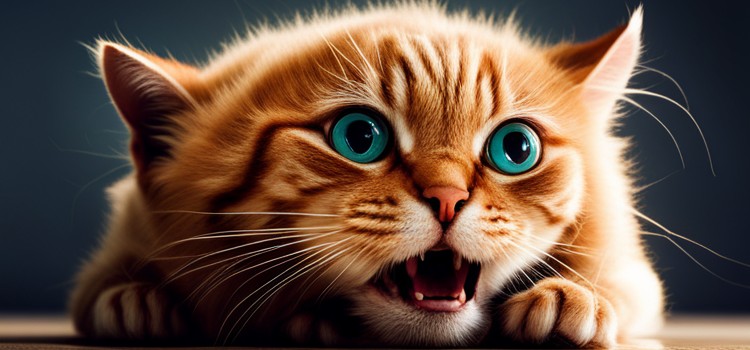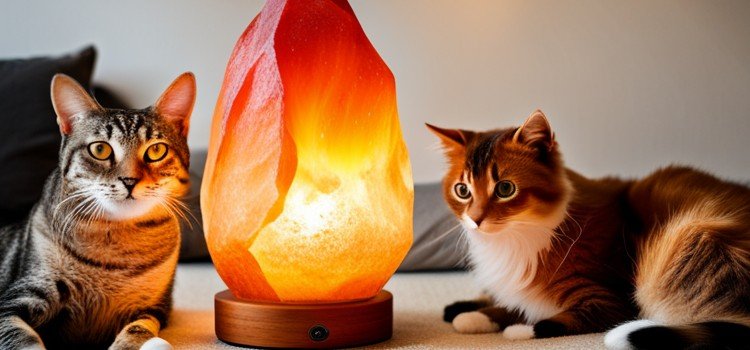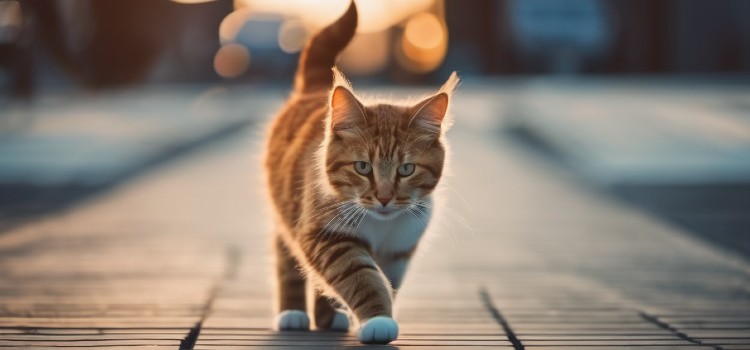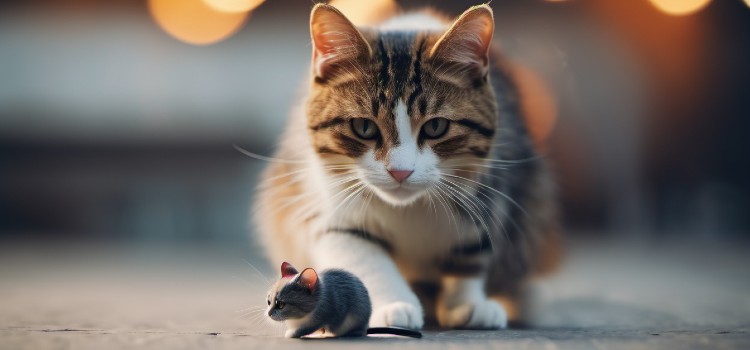As an Amazon Associate committed to the mission of improving the lives of our readers, Live-Clear.com receives a small commission from eligible purchases made through our affiliate links. This revenue enables us to keep producing insightful articles and other material.
Cats are known for their curious and often unpredictable behavior, and one question that frequently arises among cat owners is, “Do cats eat mosquitoes?” This seemingly trivial question can have implications for both your cat’s health and your home environment. This comprehensive guide delves into the world of cats and their relationship with mosquitoes. It explores their instincts, the potential risks and benefits, and how to ensure your feline friend’s well-being.
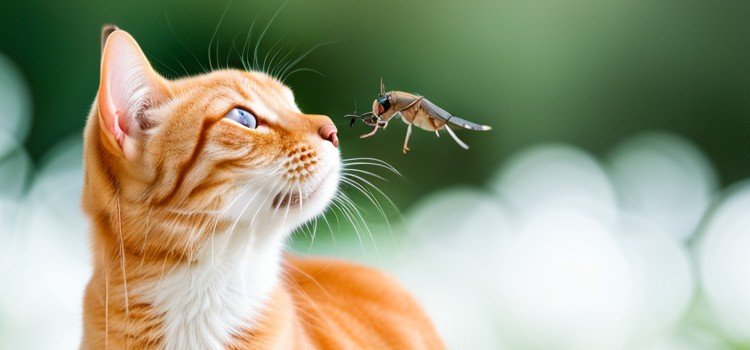
Cats and Their Instincts
The Hunter’s Instinct
Cats are natural-born hunters. They have a deep-seated instinct to chase, pounce, and catch prey. This instinct is a remnant of their wild ancestors who depended on hunting for survival. Domestic cats exhibit this behavior even when well-fed, as it’s an integral part of their genetic makeup. This hunting instinct in cats can also be seen in their behavior towards mosquitoes.
When a cat spots a mosquito flying around, it may immediately become alert and start stalking it. Cats are known for their agility and quick reflexes, making them skilled at catching small flying insects like mosquitoes. However, it’s important to note that while cats may enjoy hunting mosquitoes, they should not be relied upon as the sole method of mosquito control in your home or yard.
How Cats Detect Prey
Cats use their keen senses, particularly exceptional hearing and night vision, to detect small prey. When a mosquito buzzes near them, it triggers their hunting instincts, and they often can’t resist the urge to chase and catch it. This is because mosquitoes produce high-frequency sounds within a cat’s hearing range, making them easily detectable.
Additionally, cats’ night vision allows them to see the quick movements of mosquitoes in low-light conditions, increasing their chances of successfully catching their prey.
The Appeal of Mosquitoes
Why Do Cats Find Mosquitoes Attractive?
Mosquitoes are tiny, flying insects that produce high-pitched sounds as they fly. These sounds are often within the frequency range that cats can hear, making them a prime target for their hunting instincts. Cats find moving objects intriguing, and the erratic flight patterns of mosquitoes make them exciting prey for your feline friend.
Additionally, mosquitoes are attracted to the warmth and carbon dioxide that cats emit, making them even more appealing to felines. Furthermore, the small size of mosquitoes allows cats to practice their hunting skills without much risk or effort.
Is It Safe for Cats to Eat Mosquitoes?
While it’s generally safe for cats to catch and eat mosquitoes, there are some potential risks and benefits to consider. One potential risk is that mosquitoes can carry diseases such as heartworm, which can harm cats. However, mosquitoes are not a common source of heartworm transmission in cats, so the risk is relatively low.
On the other hand, eating mosquitoes can provide some nutritional benefits for cats, as they are a source of protein. Monitoring your cat’s behavior and health after eating a mosquito is essential to ensure no adverse effects.
Benefits of Cats Eating Mosquitoes
A Natural Pest Control Method
One of the advantages of cats eating mosquitoes is natural pest control. Mosquitoes are not only annoying for humans but can also transmit diseases to both cats and humans. Cats can help reduce the mosquito population in your home and yard, making your living environment more pleasant.
Additionally, cats have a natural hunting instinct, and chasing and catching mosquitoes can provide mental stimulation and exercise for them. This can help prevent boredom and promote overall well-being in your feline companion.
Nutritional Benefits
Cats may gain some nutritional benefits from consuming insects like mosquitoes. In the wild, cats often ingest insects as a source of essential nutrients, such as vitamins and minerals. While this is not a primary food source, it can provide supplemental nutrition.
Insects like mosquitoes are protein-rich, essential for muscle development and overall cat growth. Additionally, consuming insects can help improve their digestion and promote a healthy gut microbiome. However, it is essential to ensure that the insects are free from pesticides or harmful chemicals before allowing your cat to consume them.

Potential Risks of Cats Eating Mosquitoes
Mosquito-Borne Diseases
Despite their benefits, mosquitoes can carry diseases like heartworm, West Nile virus, and various encephalitis viruses. While it’s rare for cats to contract these diseases directly from eating mosquitoes, there is still a slight risk.
To minimize this risk, it is recommended to keep your cat on regular preventive medication for heartworm and consult with your veterinarian about any additional precautions. Additionally, it is essential to note that not all mosquitoes carry diseases so the risk may vary depending on the region and prevalence of these diseases in your area.
Allergic Reactions
Some cats may be allergic to mosquito bites, just as humans can be. An allergic reaction can lead to itching, swelling, and discomfort for your cat. Eating a mosquito may not necessarily prevent this type of reaction.
If you notice any signs of an allergic reaction in your cat, such as excessive scratching or redness, it is best to seek veterinary care. Your veterinarian can provide appropriate treatment and advice on managing and preventing future allergic reactions caused by mosquito bites.
Digestive Issues
Mosquitoes can be carriers of parasites. Ingesting mosquitoes infected with parasites can lead to digestive issues in cats. This is why it’s crucial to be cautious about the insects your cat consumes.
If your cat shows any signs of digestive issues, such as vomiting or diarrhea, it is essential to consult with your veterinarian. They can assess the situation and recommend appropriate treatment to alleviate your cat’s symptoms and ensure their overall health. Additionally, keeping your cat indoors or in screened areas can help minimize their exposure to mosquitoes and reduce the risk of ingesting infected insects.
How to Protect Your Cat from Mosquito-Related Risks
Mosquito Prevention
To reduce your cat’s risk of mosquito-borne diseases, use preventive measures such as mosquito nets, window screens, and insect repellents. Also, avoid leaving standing water around your home, as it can become a breeding ground for mosquitoes.
Regularly inspect and maintain your cat’s living area to ensure there are no areas where mosquitoes can breed, such as stagnant water in flower pots or clogged gutters. Additionally, consider consulting with your veterinarian about safe and effective mosquito control products specifically designed for cats.
Regular Vet Checkups
Regular veterinary checkups are essential to ensure your cat’s overall health. Your vet can advise you on preventive measures and treatments to protect your cat from mosquito-related risks.
These checkups can also help detect potential health issues early on, allowing for prompt treatment and prevention of further complications. By staying proactive with regular vet checkups, you can ensure your cat stays healthy and protected from mosquito-borne diseases.
Alternative Pest Control Methods
Consider alternative pest control methods if you’re concerned about your cat-eating mosquitoes. You can use pet-safe mosquito repellents, citronella candles, or mosquito traps to keep these pests at bay without exposing your cat to potential risks.
Another option is to create a mosquito-free environment for your cat by eliminating standing water and keeping your yard clean and well-maintained. Additionally, screens on windows and doors can help prevent mosquitoes from entering your home and bothering your cat.
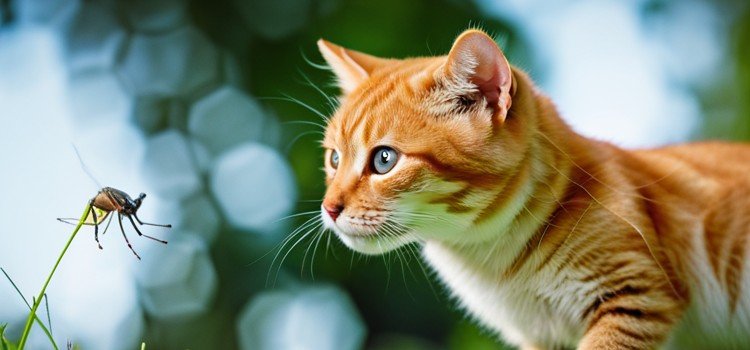
Conclusion
In summary, cats’ instinct to chase and catch mosquitoes is a natural behavior rooted in their hunting instincts. While this behavior has potential benefits, such as natural pest control and minor nutritional benefits, there are also risks, including mosquito-borne diseases and allergic reactions. To ensure your cat’s well-being, balancing allowing them to indulge in their hunting instincts and taking measures to protect them from potential risks is crucial. Being informed and proactive lets you keep your feline companion healthy and happy while coexisting with these tiny, buzzing insects.
FAQs about Cats Eating Mosquitoes
Cats are natural hunters, and their instincts drive them to catch and eat small moving objects. The high-pitched sounds and erratic flight patterns of mosquitoes make them an attractive target for cats’ hunting instincts.
While cats are unlikely to get sick from eating mosquitoes, there is a slight risk of mosquito-borne diseases or allergic reactions. It’s critical to watch for any strange signs in your cat.
Cats don’t eat mosquitoes to meet their dietary needs. They are obligate carnivores, and their primary source of nutrition should be high-quality cat food. Mosquitoes may provide limited supplemental nutrients.
Prevent mosquitoes from bothering your cat using mosquito nets, screens, and repellents. Remove potential mosquito breeding grounds, such as stagnant water, and consider alternative pest control methods.
Cats are attracted to insects, such as flies, moths, and spiders, due to their natural hunting instincts. These insects can also pique your cat’s curiosity.
To prevent mosquitoes from bothering your cat:
- Use preventive measures such as mosquito nets, window screens, and pet-safe mosquito repellents.
- Eliminate potential mosquito breeding sites like standing water around your home.
- Consider alternative pest control methods to protect your cat from these pesky insects.
Amazon and the Amazon logo are trademarks of Amazon.com, Inc, or its affiliates.
